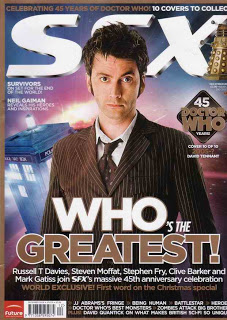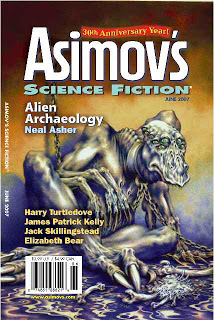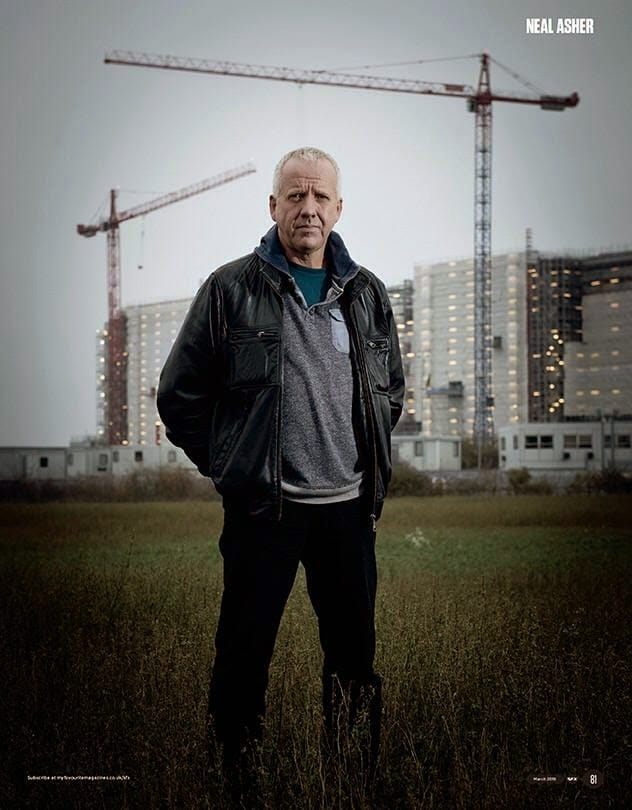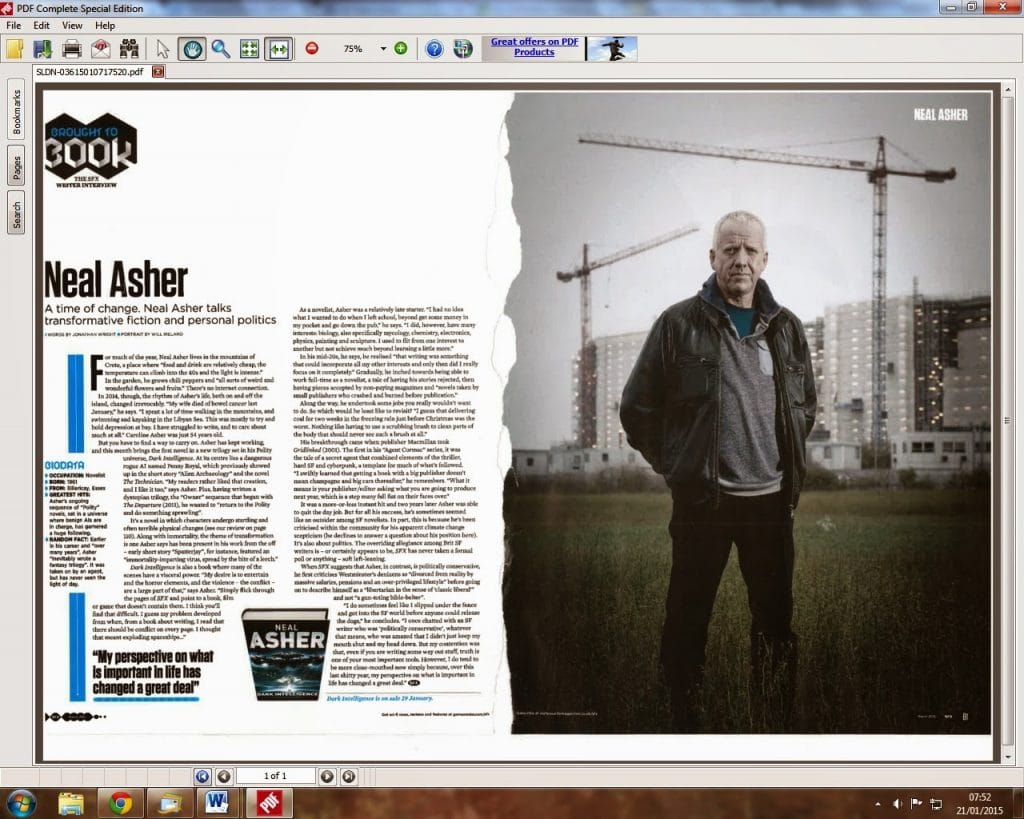Anyway, since the interview was just sampled I thought it worthwhile publishing the full text here:
Tag: Magazines
The Death of Science Fiction (Again).
SFX December 2008
 Nice profile piece on me in the December 2008 issue of SFX, with a full page picture too (inside, not that scary-eyed depilatephobe on the front cover). I can’t say it was much fun posing in the pissing rain on the Mayland mud flats, but the result seems pretty good. I’d just love to know how the other more ambitious photos of me posing against a wall of scrap turned out. That picture could have had the tagline: here is Neal Asher superimposed over a view inside his head.
Nice profile piece on me in the December 2008 issue of SFX, with a full page picture too (inside, not that scary-eyed depilatephobe on the front cover). I can’t say it was much fun posing in the pissing rain on the Mayland mud flats, but the result seems pretty good. I’d just love to know how the other more ambitious photos of me posing against a wall of scrap turned out. That picture could have had the tagline: here is Neal Asher superimposed over a view inside his head.
Hard Man of SF
Apparently what Keith Brooke calls me in the Guardian!
Writing News
Righto, I’ve cleared 100,000 words of Orbus, which is always a bit a of a milestone, and the endgame progresses nicely what with a planet getting blown to smithereens and some seriously huge dreadnoughts knocking the shite out of each other.
Nice reviews appearing here there and everywhere for Line War. There’s the previously mentioned one in SFX 169 (May), a good one from Anthony Brown in Starburst 362 and others elsewhere. I particularly like this one I found on Sarcade’s Weblog. I also like it that no one has yet accused me of the Space Opera sins of anticlimax or deus ex machina.
Had a photo shoot on Wednesday: professional photographer all the way down from Bristol to take shots of me posing in the pissing rain before Maldon mudflats and trying to look cool in a scrapyard. This is for an SFX profile which should be coming out at round about the time my short story collection gets released.
Oh yeah, and not long until Shadow of the Scorpion is available.
And I note that David Gunn’s next book is out to hopefully cause Maximum Offense!
Article 5: Getting There.
Here’s an old one. I don’t recollect precisely when I wrote it, but certainly it was prior to 1999 when Macmillan took me on and prior to ’98 when I first started really using the Internet. It’s interesting to see my attitude of the time…
Getting There.
The first time novelist or short story writer is up a certain well known creek without even a canoe. If you’re a politician, a film star, or a model (you don’t even have to be able to write), the big publishers will provide you with a nice fat cheque and a power boat. The catch for a new author is that they might publish you if you’re known and as a new author you’ll only get known if they’ll publish you. It is also a sad fact that the likes of Harper and Collins receive two to three hundred manuscripts a week out of which they might publish two or three a year. Many large publishers freely admit that they will not even look at work unless it is submitted through an agent. It would also seem that these publishers are now run primarily by accountants and financial directors. Editors wanting to take on something new have to present this work to these people to justify the expenditure. As such justifications usually begin with, “Well this is like … ” the chance of anything groundbreaking being taken is minimal. The fact, I think, that all writers should be aware of is that these large publishers are not out to make books; they’re out to make money. So what other options are there? There are, thankfully, the small presses, and through them a gradual struggle up the ladder in the hope that you’ll reach a point where you can no longer be ignored. Small press publications range from illiterate productions of stapled-together A4 sheets to some magazines indistinguishable from what you’ll find on the newsagent’s shelf. There are presses that produce paperback books of a quality that exceeds that of the mainstream publishers (How often have you had one of these mainstream paperbacks fall apart in your hands as you read it? How often has the cover picture and blurb born no relation to the contents?) It is worth noting exactly what ‘small’ means in the latter cases. It usually only refers to circulation, editor’s bank balance, and advertising. They are not necessarily small on enthusiasm or professionalism. Don’t be fooled into thinking that you can get any old crap published here, but also be aware that if you are good, you stand a better chance here than with one of the lumbering giants that has a stranglehold on the the newstands and bookshops. Unfortunately the SF F and H (magazine) small presses are pretty much a closed circuit and it is quite possible for you to be very well known in them but not known outside. Very often the magazines published have a circulation that can only be numbered in the hundreds and not very many of them. The closed circuit is due to a large proportion of their readership being writers and by the mags only advertising in each other, (no doubt due to cost). What are you after though? If it is money then forget it. Payment ranges from a free copy of the mag your story is in to, if you’re really lucky, ten or twenty quid. The most I have achieved for short story publication was £60 from a magazine called Scheherazade and that was for ten thousand words divided over two copies. If it’s an audience you’re after then the most you can hope for is that for ten or fifteen minutes you will have the undivided attention of each of those hundreds of readers. Better than nothing. A problem you’ll face, writing for these small circulation magazines, is their proliferation and their swift demise. I have frequently had stories accepted by magazines that have then folded before publication of said story. There is no fault here in the enthusiasm or even financial acumen of the editors. It is just that a circulation of any more than a few hundred seems a tough barrier to break. Some have managed to, but for every one that does it seems that twenty others go to the wall. That barrier I think is ultimately heart-breaking for many editors. Another problem can be the lengths of time involved. In some cases you will not recieve a reply for a few months, thereafter, if your work is accepted, it can be months and even years before you see your work in print, and see any cheque that might be involved. This is because small press editors have to work for a living and that job ain’t in publishing. They have piles of stories to read through and reject before they find your gem. And often they might only bring out their magazines quarterly or even yearly. You’ll often notice when looking at these magazines that they’ll have an issue number, but that the editor has not been brave enough to put on a date. In one case I had to wait three years from acceptance of one of my stories until publication. But let’s face it, if you’re a writer, you should be thinking about your next story on the way back from the post box. Why write for the small presses if your ultimate aim is big time publication? To begin with the small presses are a superb training ground for the wannabes. Very often the editors of these magazines will take time to offer some criticism of your work (remember, if that criticism is ‘this is drivel’ that’s more than you’ll get elsewhere). You’ll also get a fair amount of feedback in the letters pages and even in other magazines. In this sense the closed circuit will work for you; many of these magazines have review columns and as well as reviewing films, and large circulation books and magazines, they review each other. Also, because of that proportion of writers in the readership, you’ll know that if you do get published it is not because of a lack of submissions to the magazine. The small presses are essentially a proving ground for the wannabe. To break into the small press market you do have to buy magazines. Some magazines will only publish stories written by subscribers; a form of nepotism brought on by a desperation to get subscribers. Once you’ve bought a few magazines you’ll have a feel for them and from adverts in them you’ll find other mags to which you may send your scribblings. Each time you send something off (with an SAE and covering letter) you’ll quite probably get fliers from yet more magazines with your rejection or acceptance. It is quite easy to build up one hell of a list of possible markets. If you want to increase that list then get hold of publications like Zene, Light’s List, or Dragon’s breath. In the fifteen years I’ve been writing for the small presses I’ve felt no need to submit work outside the UK, but then I’m not someone who produces a story a day. Once you’ve broken into the small press market (meaning that you have proven your worth to yourself, not that you have learnt the funny handshake) it’s worth looking at the small press book publishers in the hope of having something longer published. As you do these things take note of your achievements and utilise what leverage they might give to get you higher up the writing ladder. Unfortunately though you’ll find that small press book publishers face similar difficulties to those of the magazine publishers. So far I’ve seen three of them get into difficulties.Club 199, a publisher aiming to produce cheap paperbacks (£1.99, hence the name) had the printing side of things organised but not the advertising side. New Guild, whom I was under contract with, made the same mistake. Tanjen, has recently ceased taking on any new work. Sadly, these small publishers are up against the huge advertising machines of the large publishers, the clout they have with the likes of W H Smiths and Waterstones, and the spreading of costs over huge print runs. For me my writing has been a gradual struggle up that ladder, the small presses being the first few rungs. Too often we hear of someone getting the x-thousands advance on their first book and hearing this lose sight of the fact that they are the exception. There is a lot of truth in the image of the writer struggling away in his garret then drinking himself to death. The reality is that writing is hard, getting published is hard, and that if you want easy money your best option is to become an estate agent. It took me five or more years to get my first short story accepted and then that magazine folded before publication of my work. After that slight boost (and it was a boost; someone had actually wanted my work) I got more and more stories published, the occasional novella serialised, and a one-off novella published for a single cash payment. For my short stories my reward was a copy of the magazine and some complimentary letters (mostly). After another five years I was getting the occasional cheque – about enough to pay for a toner cartridge a year – then in the following five years finally gained some notoriety through the publisher’s Tanjen, with the production of another novella (The Parasite) then a short story collection (The Engineer).
My story, I warn you, has been one of relative success.
Death Ray Magazine.
I must get hold of a copy of Death Ray Magazine. Here’s either part or all of a review in it of Hilldiggers:
Very nice.
Asimov's June 2007.
 Okay, my story Alien Archaeology is being published in the June 2007 issue of Asimov’s Science Fiction. In that story you’ll find a gabbleduck, as depicted on the cover here, prador and homicidal humans – some of them working for the Polity – and what I hope is a ripsnortingly enjoyable tale. In my opinion Asimov’s is one of the very few magazines that delivers a good proportion of the same (but then I would say that). Get over onto their website and take out a subscription!
Okay, my story Alien Archaeology is being published in the June 2007 issue of Asimov’s Science Fiction. In that story you’ll find a gabbleduck, as depicted on the cover here, prador and homicidal humans – some of them working for the Polity – and what I hope is a ripsnortingly enjoyable tale. In my opinion Asimov’s is one of the very few magazines that delivers a good proportion of the same (but then I would say that). Get over onto their website and take out a subscription!
Asimov's Science Fiction.
Here’s some of the blurb from the Asimov’s Science Fiction site for the June issue of the magazine. I’ve yet to see the cover with it’s picture of a gabbleduck, but certainly I’ll post it here the moment it appears!
Popular and prolific British writer Neal Asher gives us a ringside seat for a fast-paced, suspenseful, and violent game of intrigue, double-cross, and double-double-cross, as a hunt for a stolen alien artifact of immense value forces a former agent out of retirement and into a tense chase across interstellar space into hostile landscapes where wiser humans would never dare to venture, with life or death hanging in the balance at every turn, for some hard lessons in “Alien Archeology.” This one is a full-blown, flat-out, unabashed Space Opera, and a thriller of the first water, so don’t miss it! http://www.asimovs.com/_issue_0704/nextissue.shtml


